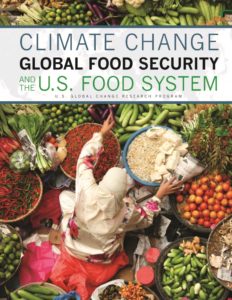
As world leaders meet in Paris for international climate change talks, a just-released report by the U.S. Department of Agriculture co-authored by Clark University Professor Edward Carr is focusing attention on how climate change will likely impact the world’s food security.
Carr, director of the International Development, Community and Environment Department, was a lead author of the 125-page report, “Climate Change, Global Food Security and the U.S. Food System,” launched Dec. 3 at the 21st session of the Conference of the Parties to the United Nations Framework Convention on Climate Change (COP21) in Paris by U.S. Department of Agriculture Secretary Thomas J. Vilsack.
“This was a three-year effort on the part of the author team, and I am really pleased with the result,” Carr said.
Carr has extensive experience working on international environmental assessments. In December 2013, he attended COP19 in Warsaw, Poland presenting, “Climate Services: Bringing Decision Makers Climate Data They Can Use” with colleagues from USAID, the World Meteorological Organization and the Red Cross Red Crescent Climate Centre, among others.
He was a lead author in the scenarios working group of the Millennium Ecosystem Assessment and the chapter on interlinked environmental challenges for the United Nations Environment Programme’s Fourth Global Environment Outlook. In addition, he was the review editor for Chapter 9 of the most recent Intergovernmental Panel on Climate Change’s Assessment Report, AR-5.
Read: The New York Times’ article “Agriculture Department Forecasts Less Abundance in the Land of Plenty” on the USDA report.

The Dec. 3 USDA report cites a figure from the Food and Agriculture Organization of the United Nations that approximately 805 million people, or 11 percent of the global population, are undernourished, down from about 1.01 billion people in 1990-1992. However, the report finds climate change is likely to reverse that progress.
“Climate change is projected to result in more frequent disruption of food production in many regions and increased overall food prices,” the report states.
Defining food security as “the ability to obtain and use sufficient amounts of safe and nutritious food,” the report calls it a “fundamental human need.” It identifies availability, access and people’s ability to utilize food as key indicators of food security, recognizing that true food security occurs when each of these components is stable over time.
At the same time, the report notes that current measures of access and utilization are inadequate for a robust assessment of global food security. Taking into account a variety of factors, including production, transportation and cost, the report says the greatest risks for food insecurity exist for the poor and those who live in tropical regions. Global trends are also likely to impact consumers and producers in the United States, which is part of a “highly-integrated global food system.”
While stating the effects of climate change can be managed through adaptation efforts at both local and global levels, the report cautions that socioeconomic factors, among others, could hamper efforts. “In the end, climate change and socioeconomic change must be analyzed in an integrated way to provide a full understanding of how food security might change in the future,” the report states.


